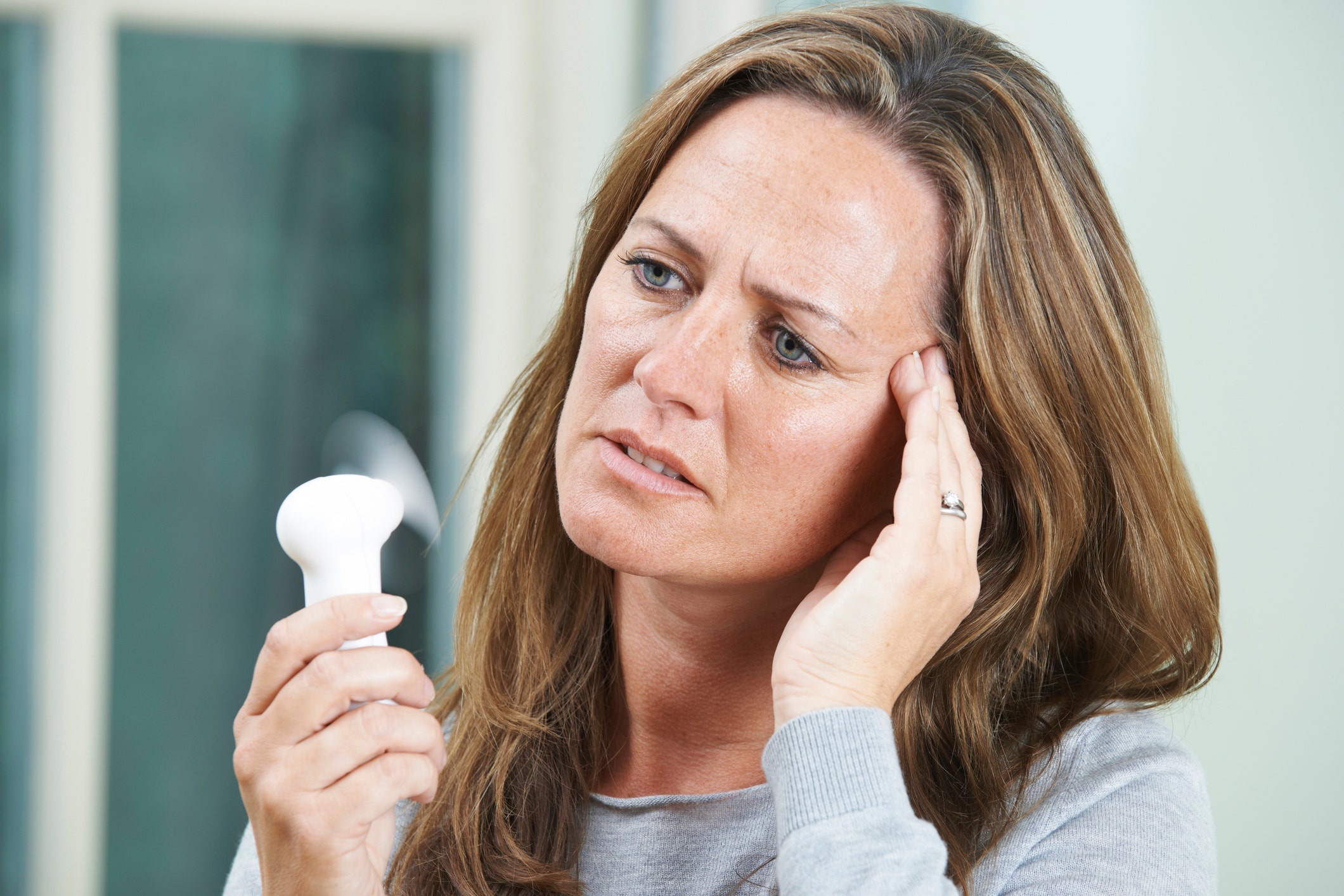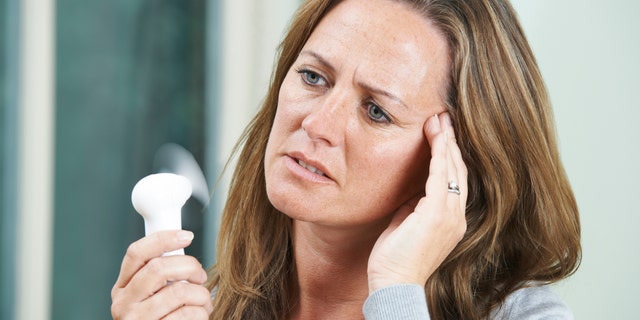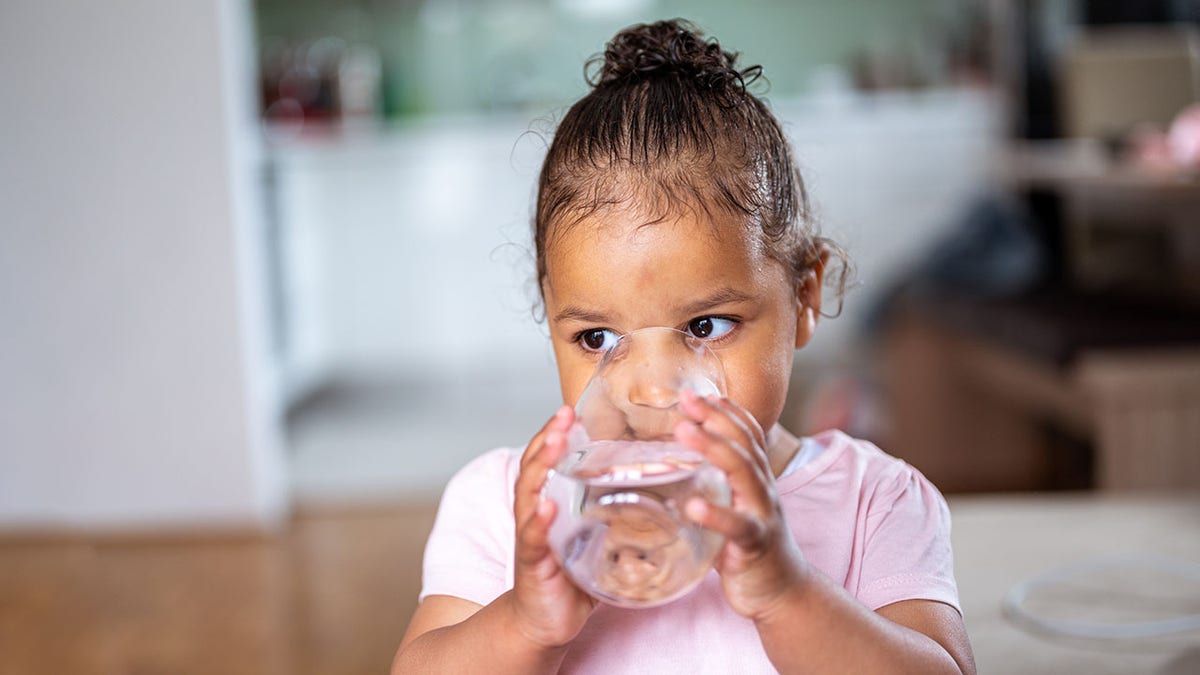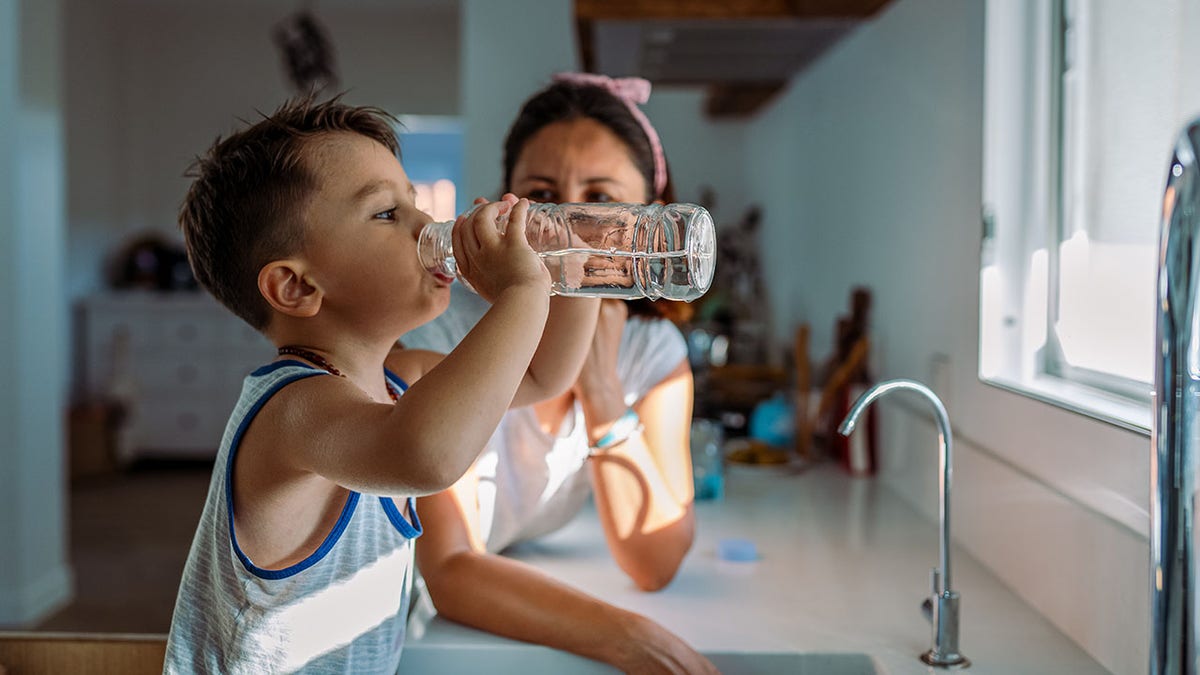Health
5 natural, non-hormonal solutions for menopause symptoms

Between those dreaded hot flashes, night sweats, mood swings and hours spent tossing and turning at night, menopause can be downright miserable.
Hormone replacement therapy is one option, but if you’re concerned about the risks or want to try natural fixes first, the good news is that there are non-hormonal remedies that can help.
A woman officially enters menopause when 12 consecutive months have passed without a menstrual period.
Leading up to this time, periods can be irregular. This often happens between the ages of 45 and 55.
6 WAYS YOU’RE MAKING YOUR MENOPAUSE SYMPTOMS WORSE
There are lots of symptoms that come with menopause that can be frustrating and affect your day-to-day life.
Here are five of the most common symptoms of menopause and natural remedies to try to relieve each symptom.
Women go through menopause after they haven’t had a period for 12 months in a row. (Fabian Sommer/picture alliance via Getty Images)
- Hot flashes
- Night sweats
- Vaginal dryness
- Insomnia
- Irritability
- Bladder control
- Dry skin
1. Hot flashes
It’s unclear what causes hot flashes, but they might be linked to the adrenal glands. When estrogen falls during menopause, the adrenal glands can become deficient, which then causes a surge of cortisol to be released and, in turn, hot flashes, said Dr. Prudence Hall, founder of The Hall Center in Santa Monica, California.
Approximately 80% of women will experience hot flashes and about 10% will have significant hot flashes that last for over 10 years, said Dr. Mary Jane Minkin, a clinical professor of obstetrics, gynecology and reproductive sciences at Yale University School of Medicine in New Haven, Connecticut, and author of “A Woman’s Guide to Sexual Health.”
Herbs such as black cohosh, wild yam, Korean ginseng and red clover can help, but you should consult with a physician, naturopath or herbalist to make sure you choose a reputable brand.
Also, avoid triggers like wine and spicy foods; try adding soy foods to your diet and dress in layers.

Hot flashes are one of the most common systems of menopause. (iStock)
Although exercise will likely make your hot flashes worse while you’re doing it, it can help alleviate symptoms throughout the day.
NAOMI WATTS ADMITS SHE WAS ‘SPIRALING OUT OF CONTROL’ WHEN SHE WENT THROUGH MENOPAUSE AT 36 YEARS OLD
Women who reported less than three sessions a week of physical activity had more severe symptoms of menopause, including hot flashes, compared to women who were more active, a study in the journal Menopause found.
Losing weight can also help hot flashes, since women who are heavy have worse hot flashes than slimmer women, Minkin said.
2. Night sweats
Approximately 95% of women will also deal with night sweats, which is not only uncomfortable, but it makes getting a good night’s sleep nearly impossible.
To feel better, adjust the thermostat, try cooling sheets, pillows or blankets and wear moisture-wicking pajamas.
ACTRESS CHERYL HINES ON THE AWKWARDNESS OF MENOPAUSE
You can also open up your windows if it is not too hot or too cold — and put a fan close to your bedside.

Night sweats can be extremely uncomfortable, so making sure you have a cool environment is essential. (iStock)
3. Vaginal dryness
Unlike hot flashes that tend to get better with time, unfortunately vaginal dryness gets worse. The decrease in estrogen levels causes the vaginal tissues to become thin and dry, which leads to discomfort, itching, irritation and pain during sexual intimacy.
If it’s not treated, vaginal dryness can lead to atrophic vaginitis, a condition that causes the walls of the vagina to become inflamed.
Some things to try to include long-lasting over-the-counter moisturizers that can be used two to three times a week, or coconut oil and personal lubricants when you have sex.
4. Insomnia
Restlessness, waking up several times throughout the night, or trouble falling asleep are all common during menopause.
Questioning who you are or your life’s purpose, which is common during this stage of life, can cause anxiety and also make sleeping difficult, Hall said.

Menopause can cause individuals to have a hard time falling asleep and staying asleep at night. (iStock)
Make a point to exercise every day, which can help you sleep — but if you do it too close to bedtime, it might keep you up.
Avoid known triggers like alcohol and caffeine, and practice good sleep hygiene by keeping your bedroom cool and dark and powering down electronics one to two hours before you get into bed.
Acupuncture can help relieve sleep disturbances associated with menopause too, according to a systematic review and meta-analysis published in the journal Obstetrics & Gynecology.
You can also try calming practices like yoga and meditation before hitting the hay to keep yourself extra relaxed.
5. Irritability
During menopause, there are many factors at play that can cause you to feel on edge.

During menopause, continue to do the things that you love to do, keep yourself busy and practice calming techniques when necessary. (iStock)
For starters, when estrogen is low, it can affect the neurotransmitters in the brain and lead to irritability and mood swings. If your libido is low and your body isn’t releasing oxytocin, the “love hormone” during an orgasm, your mood can suffer. Not to mention that if you’re not sleeping, you’re bound to feel crabby.
To cope, find opportunities to de-stress and relax, whether it’s heading to the spa for a massage, meditating or meeting friends for dinner. If your poor mood persists, it’s important to see your doctor because thyroid levels can plummet during menopause, which might be the real reason you’re feeling low.
Remember to continue doing the things that bring you joy.
Although menopause is no walk in the park, it’s important to take time to take care of yourself.
“Even if we’ve given our care, our love and our attention to everyone else, now is the time for ourselves, so we stay full of light, love and life,” Hall said.
6. Bladder control
It is common to lose bladder control during menopause.
Some things you can do to help with bladder control during menopause is to lower your intake of beverages that contain caffeine, since this typically fills the bladder quickly.
You can also try a more scheduled approach to going to the bathroom. While this may take time to establish, try to retrain your body to go to the bathroom at certain times of the day, which over time can help the urge to use the bathroom at any point in the day go away.
Two times of the day to plan a trip to the bathroom are as soon as you wake up in the morning and before going to bed for the night. Also, try to not drink too much water right before you go to bed to avoid having to go during the night.
7. Dry skin
If you are noticing that your skin is extra dry, which commonly happens during menopause, make sure that you are moisturizing a little extra.
To keep your skin moisturized, drink plenty of water. Also, find a face moisturizer that works for you and your skin type.
The most important time to moisturize is after washing your face, which is vital to keeping skin clean, but can also have a drying effect. To avoid skin dryness, make sure to moisturize multiple times a day.
Julie Relevant contributed reporting.

Health
Jennifer Hudson Lost 80-Lbs Without Depriving Herself—Learn Her Secrets

Sign Up
Create a free account to access exclusive content, play games, solve puzzles, test your pop-culture knowledge and receive special offers.
Already have an account? Login
Use left and right arrow keys to navigate between menu items.
Use escape to exit the menu.
Health
Kennedy’s Plan for the Drug Crisis: A Network of ‘Healing Farms’

Though Mr. Kennedy’s embrace of recovery farms may be novel, the concept stretches back almost a century. In 1935, the government opened the United States Narcotic Farm in Lexington, Ky., to research and treat addiction. Over the years, residents included Chet Baker and William S. Burroughs (who portrayed the institution in his novel, “Junkie: Confessions of an Unredeemed Drug Addict”). The program had high relapse rates and was tainted by drug experiments on human subjects. By 1975, as local treatment centers began to proliferate around the country, the program closed.
In America, therapeutic communities for addiction treatment became popular in the 1960s and ’70s. Some, like Synanon, became notorious for cultlike, abusive environments. There are now perhaps 3,000 worldwide, researchers estimate, including one that Mr. Kennedy has also praised — San Patrignano, an Italian program whose centerpiece is a highly regarded bakery, staffed by residents.
“If we do go down the road of large government-funded therapeutic communities, I’d want to see some oversight to ensure they live up to modern standards,” said Dr. Sabet, who is now president of the Foundation for Drug Policy Solutions. “We should get rid of the false dichotomy, too, between these approaches and medications, since we know they can work together for some people.”
Should Mr. Kennedy be confirmed, his authority to establish healing farms would be uncertain. Building federal treatment farms in “depressed rural areas,” as he said in his documentary, presumably on public land, would hit political and legal roadblocks. Fully legalizing and taxing cannabis to pay for the farms would require congressional action.
In the concluding moments of the documentary, Mr. Kennedy invoked Carl Jung, the Swiss psychiatrist whose views on spirituality influenced Alcoholics Anonymous. Dr. Jung, he said, felt that “people who believed in God got better faster and that their recovery was more durable and enduring than people who didn’t.”
Health
Children exposed to higher fluoride levels found to have lower IQs, study reveals

The debate about the benefits and risks of fluoride is ongoing, as RFK Jr. — incoming President Trump’s pick for HHS secretary — pushes to remove it from the U.S. water supply.
“Fluoride is an industrial waste associated with arthritis, bone fractures, bone cancer, IQ loss, neurodevelopmental disorders and thyroid disease,” RFK wrote in a post on X in November.
A new study published in JAMA Pediatrics on Jan. 6 found another correlation between fluoride exposure and children’s IQs.
RFK JR. CALLS FOR REMOVAL OF FLUORIDE FROM DRINKING WATER, SPARKING DEBATE
Study co-author Kyla Taylor, PhD, who is based in North Carolina, noted that fluoridated water has been used “for decades” to reduce dental cavities and improve oral health.
Fluoride exposure has been linked to a variety of negative health effects, yet benefits oral health. (iStock)
“However, there is concern that pregnant women and children are getting fluoride from many sources, including drinking water, water-added foods and beverages, teas, toothpaste, floss and mouthwash, and that their total fluoride exposure is too high and may affect fetal, infant and child neurodevelopment,” she told Fox News Digital.
The new research, led by scientists at the National Institute of Environmental Health Sciences (NIEHS), analyzed 74 epidemiological studies on children’s IQ and fluoride exposure.
FEDERAL JUDGE ORDERS EPA FURTHER REGULATE FLUORIDE IN DRINKING WATER DUE TO CONCERNS OVER LOWERED IQ IN KIDS
The studies measured fluoride in drinking water and urine across 10 countries, including Canada, China, Denmark, India, Iran, Mexico, Pakistan, New Zealand, Spain and Taiwan. (None were conducted in the U.S.)
The meta-analysis found a “statistically significant association” between higher fluoride exposure and lower children’s IQ scores, according to Taylor.
“[It showed] that the more fluoride a child is exposed to, the more likely that child’s IQ will be lower than if they were not exposed,” she said.

Scientists found a “statistically significant association” between higher fluoride exposure and lower children’s IQ scores. (iStock)
These results were consistent with six previous meta-analyses, all of which reported the same “statistically significant inverse associations” between fluoride exposure and children’s IQs, Taylor emphasized.
The research found that for every 1mg/L increase in urinary fluoride, there was a 1.63-point decrease in IQ.
‘Safe’ exposure levels
The World Health Organization (WHO) has established 1.5mg/L as the “upper safe limit” of fluoride in drinking water.
“There is concern that pregnant women and children are getting fluoride from many sources.”
Meanwhile, the U.S. Public Health Service recommends a fluoride concentration of 0.7 mg/L in drinking water.
“There was not enough data to determine if 0.7 mg/L of fluoride exposure in drinking water affected children’s IQs,” Taylor noted.
FDA BANS RED FOOD DYE DUE TO POTENTIAL CANCER RISK
Higher levels of the chemical can be found in wells and community water serving nearly three million people in the U.S., the researcher noted.
She encouraged pregnant women and parents of small children to be mindful of their total fluoride intake.

Nearly three million people have access to wells and community water with fluoride levels above the levels suggested by the World Health Organization. (iStock)
“If their water is fluoridated, they may wish to replace tap water with low-fluoride bottled water, like purified water, and limit exposure from other sources, such as dental products or black tea,” she said.
“Parents can use low-fluoride bottled water to mix with powdered infant formula and limit use of fluoridated toothpaste by young children.”
For more Health articles, visit www.foxnews.com/health.
While the research did not intend to address broader public health implications of water fluoridation in the U.S., Taylor suggested that the findings could help inform future research into the impact of fluoride on children’s health.
Dental health expert shares cautions
In response to this study and other previous research, Dr. Ellie Phillips, DDS, an oral health educator based in Austin, Texas, told Fox News Digital that she does not support water fluoridation.

The study researcher encouraged parents of small children to be mindful of their total fluoride intake. (iStock)
“I join those who vehemently oppose public water fluoridation, and I question why our water supplies are still fluoridated in the 21st century,” she wrote in an email.
“There are non-fluoridated cities and countries where the public enjoy high levels of oral health, which in some cases appear better than those that are fluoridated.”
CLICK HERE TO SIGN UP FOR OUR HEALTH NEWSLETTER
Phillips called the fluoride debate “confusing” even among dentists, as the American Dental Association (ADA) advocates for fluoride use for cavity prevention through water fluoridation, toothpaste and mouthwash — “sometimes in high concentrations.”

Fluoride is used in water, toothpaste and mouthwash to help prevent cavities. (iStock)
“[But] biologic (holistic) dentists generally encourage their patients to fear fluoride and avoid its use entirely, even if their teeth are ravaged by tooth decay,” she said.
“Topical fluoride is beneficial, while systemic consumption poses risks.”
Phillips encouraged the public to consider varying fluoride compounds, the effect of different concentrations and the “extreme difference” between applying fluoride topically and ingesting it.
“Topical fluoride is beneficial, while systemic consumption poses risks,” she cautioned.
“Individuals must take charge of their own oral health using natural and informed strategies.”
The study received funding from the National Institute of Environmental Health Sciences (NIEHS), the National Institutes of Health (NIH) and the Intramural Research Program.
-
/cdn.vox-cdn.com/uploads/chorus_asset/file/25822586/STK169_ZUCKERBERG_MAGA_STKS491_CVIRGINIA_A.jpg)
/cdn.vox-cdn.com/uploads/chorus_asset/file/25822586/STK169_ZUCKERBERG_MAGA_STKS491_CVIRGINIA_A.jpg) Technology1 week ago
Technology1 week agoMeta is highlighting a splintering global approach to online speech
-

 Science1 week ago
Science1 week agoMetro will offer free rides in L.A. through Sunday due to fires
-
/cdn.vox-cdn.com/uploads/chorus_asset/file/23935558/acastro_STK103__01.jpg)
/cdn.vox-cdn.com/uploads/chorus_asset/file/23935558/acastro_STK103__01.jpg) Technology7 days ago
Technology7 days agoAmazon Prime will shut down its clothing try-on program
-

 News1 week ago
News1 week agoMapping the Damage From the Palisades Fire
-
/cdn.vox-cdn.com/uploads/chorus_asset/file/25826211/lorealcellbioprint.jpg)
/cdn.vox-cdn.com/uploads/chorus_asset/file/25826211/lorealcellbioprint.jpg) Technology6 days ago
Technology6 days agoL’Oréal’s new skincare gadget told me I should try retinol
-
/cdn.vox-cdn.com/uploads/chorus_asset/file/25832751/2192581677.jpg)
/cdn.vox-cdn.com/uploads/chorus_asset/file/25832751/2192581677.jpg) Technology3 days ago
Technology3 days agoSuper Bowl LIX will stream for free on Tubi
-

 Business4 days ago
Business4 days agoWhy TikTok Users Are Downloading ‘Red Note,’ the Chinese App
-
/cdn.vox-cdn.com/uploads/chorus_asset/file/25835602/Switch_DonkeyKongCountryReturnsHD_scrn_19.png)
/cdn.vox-cdn.com/uploads/chorus_asset/file/25835602/Switch_DonkeyKongCountryReturnsHD_scrn_19.png) Technology1 day ago
Technology1 day agoNintendo omits original Donkey Kong Country Returns team from the remaster’s credits














